Assembly Bill Would Create New Rules for Commercial Fishing in California, Ban Gill Nets Around Channel Islands
Commercial Fishermen of Santa Barbara President Warns Proposed Regulations Could Have ‘Devastating Impacts’ on Fisheries
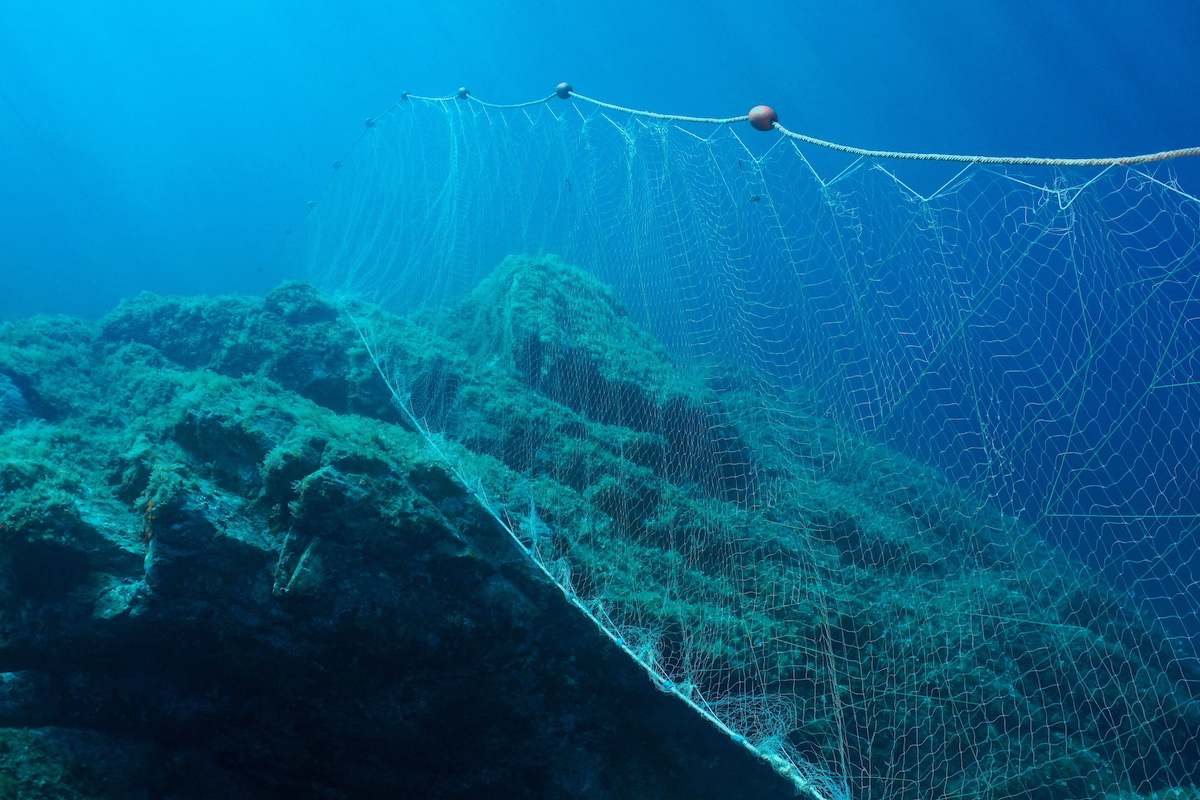
In Southern California waters, nearly invisible nets spanning up to a mile along the seafloor are set to trap and kill unsuspecting halibut and white sea bass. However, creatures such as whales, sea lions, and sharks are not safe from their clutches.
These set gill nets have been banned off the coasts of Central and Northern California for decades. But they are still used in federal waters, offshore banks, and around the Channel Islands.
Ventura Assemblymember Steve Bennett is trying to change that. Bennett’s recently proposed Assembly Bill 2220 seeks to end exemptions in state law that allow the nets to catch and keep protected species such as great white sharks and giant sea bass.
It would also ban the use of gill nets within three miles of the Channel Islands, as well as freeze set gill net permits and authorize the California Department of Fish and Wildlife to require third-party observers on state fisheries.
But while ocean conservationists say it would help protect biodiversity, fishermen see the proposed regulations as a threat to their livelihoods.
What the fishermen want to catch are profitable California halibut and white seabass. However, because of the size of the nets, and how long they are set, other species incidentally get tangled in them too.
“And they’re set in an extremely diverse ecosystem in Southern California,” said Caitlynn Birch, a Pacific marine scientist for ocean conservation organization Oceana, one of the bill’s sponsors.
“[Fishermen] can technically say they’re not targeting anything, but they’re still catching lots of species just by the nature of the nets and how nonselective it is.”
While white sharks and other protected species are largely prohibited for commercial and recreational take in California, Birch said there is a special “loophole” in existing state law for the set gill net fishery that allows them to catch and keep those species. It stems from aquariums, like SeaWorld, wishing to collect great white sharks as live display animals.
However, according to an April 2023 report by Oceana and Turtle Island Restoration Network, more than half of the animals caught in the nets are thrown overboard as waste, including 90 percent of all the young great white sharks caught and discarded in California fisheries (estimated in 2011 to be 25 per year).
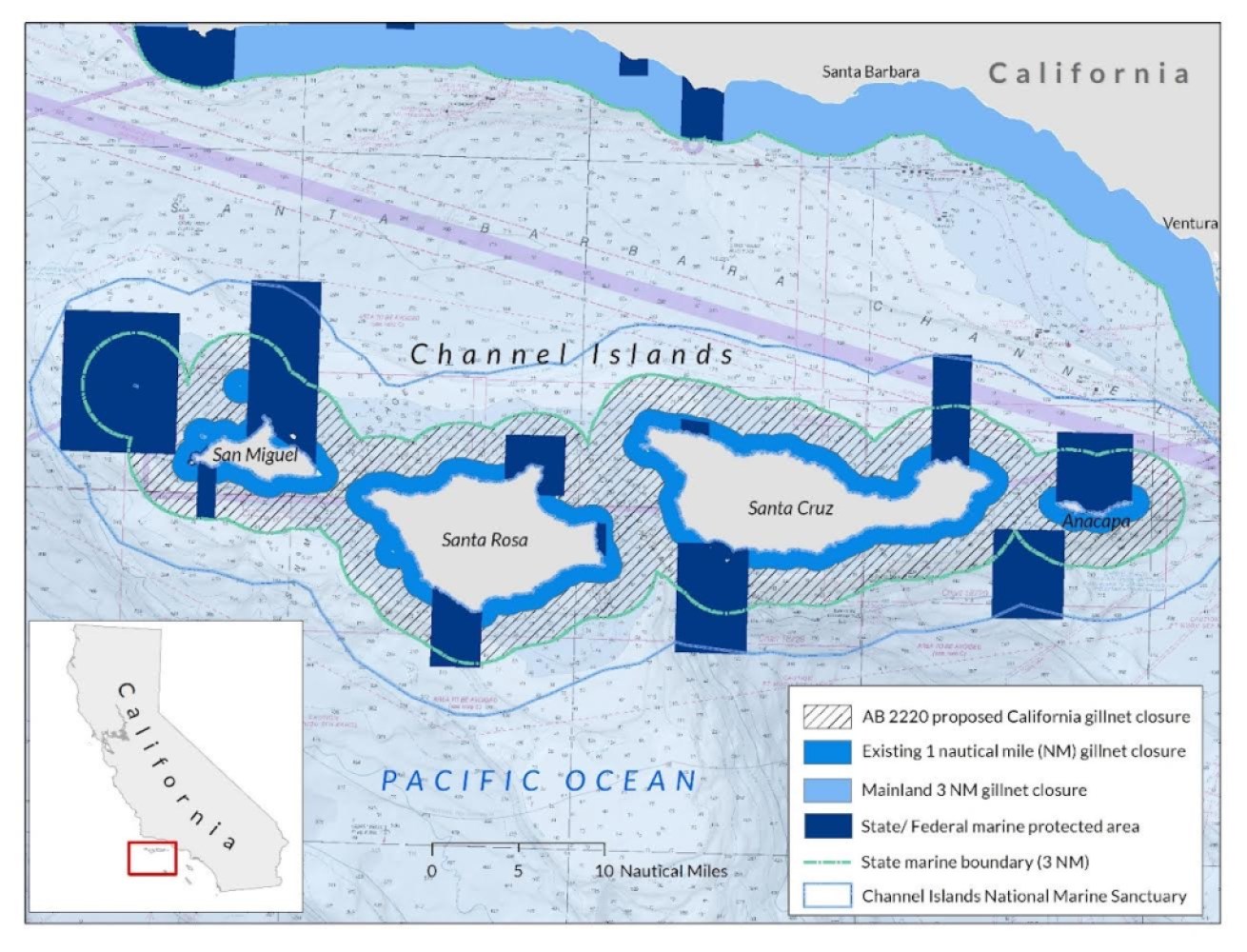
Although the new bill could not possibly prevent all bycatch, it would prevent the sale of protected species, removing any potential incentive to catch and keep them, Birch said.
But through the freeze on permits, “Over the next few generations, we would see the gill net fishery dwindling in size and therefore the bycatch impacts also dwindling in size,” Birch added.
However, Chris Voss, president of the Commercial Fishermen of Santa Barbara, said that with the way the bill is crafted, “it’s liable to have devastating impacts on several fisheries, if not all fisheries, in the state of California.”
He continued, “And it’s, in my view, an underhanded effort on the part of Oceana, and maybe representative Bennett, who I think has made a big mistake in signing on to this legislation.”
Voss believes the bill could damage the state economy by lowering the number of locally caught fish in California fish markets. He also worries that the bill could be “taken to the extreme” by requiring fishermen to shoulder the financial burden of 100 percent observer coverage on boats.
“And when you essentially criminalize something like the incidental take of sea bass and white sharks and then require observer coverage, that’s a trap,” he explained. “So you accidentally take an illegal sea bass, and you’ve been observed doing it.”
California fishermen are already under intense regulatory scrutiny, he argued, leading to a drastic decline in their numbers over the last 30 years. He thinks that “going directly to legislation” was a way of “poisoning the waters” around what could have been a collaborative process for dealing with bycatch issues associated with the set gill net fishery.
“There’s a pretty significant regulatory framework that already exists,” Voss said. “The details are critical to know before you put a bunch of guys out of work.”
AB 2220 will have its first hearing in April.
Premier Events
Fri, Jan 31
5:00 PM
Santa Barbara
Artist Talk at Art & Soul on State Street
Wed, Jan 22
5:30 PM
Santa Barbara
Talk: “Raising Liberated Black Youth”
Sun, Jan 26
11:00 AM
Santa Barbara,
17th Annual Santa Barbara Community Seed Swap 2025
Thu, Jan 30
8:00 PM
Solvang
Lucinda Lane Album-Release Show, at Lost Chord Guitars
Fri, Jan 31
9:00 AM
Goleta
AARP FREE TAX PREPARATION
Fri, Jan 31
5:00 PM
Santa Barbara
Artist Talk at Art & Soul on State Street
Sat, Feb 08
10:00 AM
Santa Barbara
Paseo Nuevo Kids Club
Sat, Feb 08
12:30 PM
Solvang
Garagiste Wine Festival
Tue, Feb 11
8:00 PM
Santa Barbara
SBIFF – Tribute to Timothée Chalamet
Thu, Feb 13
8:00 PM
Santa Barbara
SBIFF – Tribute to Adrien Brody and Guy Pierce
Fri, Jan 31 5:00 PM
Santa Barbara
Artist Talk at Art & Soul on State Street
Wed, Jan 22 5:30 PM
Santa Barbara
Talk: “Raising Liberated Black Youth”
Sun, Jan 26 11:00 AM
Santa Barbara,
17th Annual Santa Barbara Community Seed Swap 2025
Thu, Jan 30 8:00 PM
Solvang
Lucinda Lane Album-Release Show, at Lost Chord Guitars
Fri, Jan 31 9:00 AM
Goleta
AARP FREE TAX PREPARATION
Fri, Jan 31 5:00 PM
Santa Barbara
Artist Talk at Art & Soul on State Street
Sat, Feb 08 10:00 AM
Santa Barbara
Paseo Nuevo Kids Club
Sat, Feb 08 12:30 PM
Solvang
Garagiste Wine Festival
Tue, Feb 11 8:00 PM
Santa Barbara
SBIFF – Tribute to Timothée Chalamet
Thu, Feb 13 8:00 PM
Santa Barbara











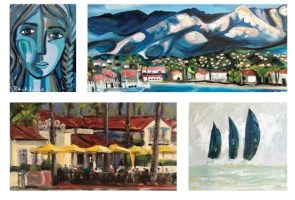

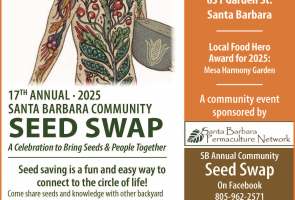
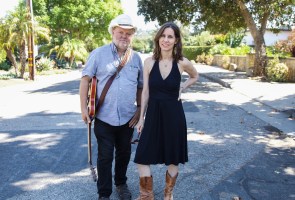





You must be logged in to post a comment.